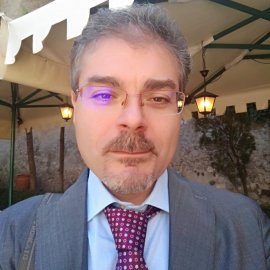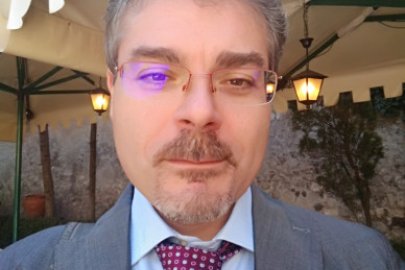Critical Theory, Decolonial Thinking and the Genealogy of Modernity.

Janvier 2023 à juin 2023
Raffaele Carbone is an associate professor at the Department of Humanities of the Federico II University in Naples, where he teaches the History of Philosophy and the Philosophy and History of Ideas, and directed the research project “MOSCHO” (2019- 2021).
Since June 2019, he has been “Directeur de Programme” at the Collège International de Philosophie in Paris.
He was a fellow at the University of Paris 1 Panthéon-Sorbonne (Marie de Paris “Research in Paris” Programme), adjunct professor at the Paul Valéry University-Montpellier 3, visiting scholar at the Collegium de Lyon, the Centre Marc Bloch in Berlin and the Fondation Maison des Sciences de l’Homme in Paris. His research specializes in modern philosophy (Montaigne, Malebranche, Spinoza), in the reception of modern thinkers in the 20th century, and in the early Frankfurt School.
Critical Theory, Decolonial Thinking and the Genealogy of Modernity.
Over these first two decades of the new century, philosophers, political scientists and sociologists have been examining the ideas and ambitions that animated the original project of a Critical Theory of society elaborated by Horkheimer and his colleagues at the Institut für Sozialforschung in Frankfurt am Main and have tried to reformulate and renew this theoretical corpus in accordance with the demands of our time.
The current debates lead us a systematical rethinking of the initial project of Critical Theory and, considering that it is in constant movement and linked to the practice, to put it to the test of specific present problems. This project proposes to take stock of the present day state of Critical Theory, by reconstructing Horkheimer’s project during the 1930s and 1940s, examined from a historical-philological perspective, and facing the objections to Critical Theory by the decolonial thinkers, in particular the idea that the great limitation of Critical Theory is that it failed to geolocalise domination and to investigate the specifically colonial character of power in the knowledge-power complex. In this vein, it is crucial to ask: in what sense would a decolonial perspective require that the work of European thinkers in general, and of first-generation critical theorists in particular, be substituted, complemented, or transformed by non-European perspectives?
Which of these alternatives would be more adequate for dealing with the fierce criticism of modernity and rationality developed by Horkheimer and his colleagues in a non-Eurocentric manner? To address the issues at stake the proposed project would like to rethink the early Frankfurt School reconstruction of modernity and its interdisciplinary research by rereading its entire corpus and emphasising lesser-known, untranslated or neglected texts and documents.
• “Les intermittences du religieux chez les peuples amérindiens dans l’Histoire d’un voyage faict en la terre du Brésil”, in Le Verger, Bouquet XXV: L’Histoire d’un voyage faict en la terre du Bresil de Jean de Léry, edited by Augustin Lesage and Lisa Pochmalicki, 2022, p. 1-12, http://cornucopia16.com/blog/2023/01/06/raffaele-carbone-les-intermittences-du-religieux-chez-les-peuples-amerindiens-dans-lhistoire-dun-voyage-faict-en-la-terre-du-bresil/.
• “Formes de vie et dynamique historique chez Max Horkheimer”, in Archives de Philosophie, Special issue directed by Estelle Ferrarese, Vol. 85, No. 2, 2022, pp. 45-60.
• “L’âge bourgeois et la philosophie moderne: Horkheimer lecteur de Descartes et Spinoza”, in Lectures contemporaines de la philosophie moderne, edited by Éric Marquer and Paul Rateau, Paris: Publications de la Sorbonne, 2022, p. 41-60.
• Modernità e critica/Modernity and Critique/Modernité et critique, edited by Raffaele Carbone, Naples: La Città del Sole, “Crisis and Critique” Series, 2022.
• “Critique of Forms of Life and Critique of Modernity: From Jaeggi to Horkheimer”, in Modernità e critica/Modernity and Critique/Modernité et critique, edited by Raffaele Carbone, Naples: La Città del Sole, “Crisis and Critique” Series, 2022, p. 435-459.
• Genealogie filosofiche dell’identità moderna: tra biologia, etica e politica / Philosophical Genealogies of Modern Identity: Between Biology, Ethics and Politics, edited by Raffaele Carbone and Francesco Toto, in Paradigmi. Rivista di Critica Filosofica, vol. 40, n° 3, 2022, pp. 359-518.
• “‘Des cannibales’ et les différentes significations du concept de raison chez Montaigne”, in Modernos & Contemporâneos: International Journal of Philosophy, Vol. 5, No. 11, 2021, p. 4-20, https://www.ifch.unicamp.br/ojs/index.php/modernoscontemporaneos/article/view/4464.
• “Società borghese, umanesimo e teoria critica nella prospettiva di Max Horkheimer”, in Archivio di Storia della Cultura, Vol. 33, 2020, p. 245-272.
• “Differences, Migration, and Cultural Exchange in Vico”, in Philological Encounters, Vol. 5, No. 1, 2020, p. 25-49.
• “Horkheimer and the Criticism of Culture”, in EdA: Esempi di architettura, Special Issue, 2019, p. 65-73.
• “Montaigne und die kulturelle Differenz. Ein Parcours durch den Mittelmeerraum und die italienischen Städte”, in Fluchtpunkt. Das Mittelmeer und die europäische Krise, edited by Franck Hofmann, Markus Messling, Berlin: Kulturverlag Kadmos, 2017, p. 191-208.
